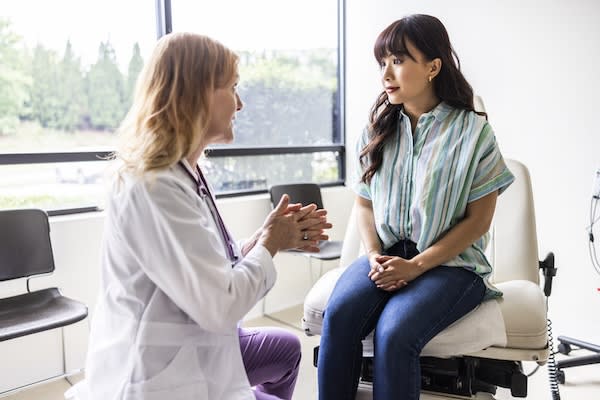
[5 MIN READ]
-
The main ways to check for cervical cancer are through a Pap test and an HPV test.
-
The U.S. Preventive Services Task Force recommends that women start cervical cancer screening at age 21.
-
Some of the biggest risk factors for cervical cancer include smoking and becoming sexually active at a young age.
Cervical cancer prevention: Screening tests and what you need to know
With the start of a new year, many of us vow to prioritize our health and well-being. While these goals are often centered around weight loss or stress reduction, it’s also important to prioritize your sexual and reproductive health.
January is Cervical Health Awareness Month. The Women’s Health team at Providence wants to encourage you to take charge of your sexual and reproductive health. You can do this by talking to your health care provider about screening recommendations to protect yourself against cervical cancer and other cervical health issues, and about how to catch cervical cancer in the early stages.
What is cervical health and cervical cancer?
Cervical cancer begins in a woman’s cervix — a narrow cylinder at the bottom of the uterus that connects to the vagina. Almost all cervical cancers are caused by the human papillomavirus (HPV), according to the Centers for Disease Control and Prevention. HPV is the most common sexually transmitted infection in the country, and it is spread through vaginal, anal and oral sex or intimate skin-to-skin contact. In most cases, HPV infection clears up on its own. When it lingers, HPV can cause health concerns like genital warts or cervical cancer.
What screening tests are essential for early detection of cervical health issues?
There are three ways to check for cervical cancer:
- The Pap test (also called a Pap smear) looks at cervical cells to detect abnormalities that may become cancerous if left untreated.
- The HPV test identifies whether the HPV virus is present in the body.
- The HPV/Pap co-test uses both of these tests together.
How often should you have a cervical cancer screening?
The U.S. Preventive Services Task Force (USPSTF) has developed cervical cancer screening guidelines for women:
- Ages 21-29 — The USPSTF recommends getting your first Pap test at age 21, with a follow-up test every three years. Women who are sexually active do not need a Pap test before age 21.
- Ages 30-65 — The USPSTF recommends you use one of the following methods for screening:
- HPV test every five years
- Pap test every three years
- HPV/Pap co-test every five years
- Older than 65 — Women in this age group should talk to their health care provider to find out if regular screening is still necessary. If you have had normal tests throughout your life, you can probably stop screening. But if you have had abnormal results, you may need to continue.
You may need more frequent screening than the above guidelines if you:
- Have had cervical cancer
- Have a weakened immune system
- Had a recent abnormal screening result
- Are HIV positive
- Were exposed before birth to a medicine called diethylstilbestrol (DES)
What are the risk factors for cervical cancer?
Some of the most important risk factors for cervical cancer include:
- Smoking — According to the American Cancer Society, women who smoke are twice as likely to get cervical cancer as those who don’t smoke.
- Becoming sexually active at a young age or having multiple sexual partners — This increases your exposure to HPV.
- Using birth control pills for a long period of time — Research has suggested that long-term use of oral contraceptives increases a woman’s average risk of cervical cancer.
- Not eating enough fruits and vegetables — This also can increase the risk for cervical cancer.
How can the HPV vaccine help prevent cervical cancer?
HPV vaccination (for example, GARDASIL 9) can prevent HPV infection, which is the virus that causes most cervical cancer cases, genital warts and pre-cancerous cells in the cervix. It’s given as a vaccine series of two or three doses, depending on your age when first vaccinated.
According to the Centers for Disease Control and Prevention (CDC):
- HPV vaccines are recommended at age 11 or 12 and may be given as early as age 9 for both boys and girls.
- If not done earlier, vaccination is recommended for young adults through age 26.
- If you are 27 through 45 years old, talk to your doctor about whether you should be vaccinated.
- If you have an HPV infection or have been treated for precancerous conditions of the cervix, talk to your doctor about vaccination, because recent studies have shown a lower chance of recurrence if you get the vaccine.
The HPV vaccine dosing works best if it’s given before you are exposed to the HPV virus. It prevents new infections, but does not treat any that are already present when you get the vaccine.
What are the signs and symptoms of early stage cervical cancer?
The first signs of cervical cancer, which may take time to develop, include:
- Pain during sex
- Watery or bloody vaginal discharge
- Vaginal bleeding after sex, between periods or after menopause
If you have any of these signs, talk to your health care provider right away.
What should you do if you have abnormal screening results?
The National Cancer Institute points out that people who have regular cervical screening are rarely found to have cancer. If you have abnormal screening results, you are likely to have either HPV or cell changes that can be treated early to prevent cancer.
Regardless, you will need to follow up with your gynecologist. They may recommend:
- A colposcopy, in which the doctor inserts a speculum into your vagina and uses an instrument to closely examine the area
- A biopsy, a procedure that removes cells to check for cancer
According to Diana Pearre, M.D., a gynecologic oncologist at Providence Specialty Medical Group in Burbank, California, medical professionals’ increased knowledge about how to prevent cervical cancer has helped them prevent HPV and catch it early.
“In general, cervical cancer is a rare disease in the United States,” she says. “Now, HPV is more often leading to other kinds of cancers, such as oropharyngeal cancers in both men and women, which are cancers of the head and neck.”
There’s still plenty of work to do, however, to get the word out about HPV vaccination — particularly among those under 30 years of age. “If you are under 30, or if you know someone in that age group, urge them to get vaccinated,” Dr. Pearre said.
Contributing caregiver

Diana Pearre, M.D., is a gynecologic oncologist at Providence Specialty Medical Group in Burbank, California.
Find a doctor
If you are looking for a Providence gynecologist, search for one in our provider directory.
Download the Providence app
It’s all in the app: easily stay connected with Providence and your health. With the Providence app, you can schedule appointments, have virtual visits from the comfort of your own home, get health recommendations personalized for you, access your health records and so much more. Learn more and download the app.
Related resources
Choosing knowledge helped one woman take charge of her health
New vaccine being studied for HPV+ head and neck cancer
Learn common myths about vaccines and which ones you need
This information is not intended as a substitute for professional medical care. Always follow your health care professional’s instructions.
About the Author
More Content by Providence Women's Health Team




















